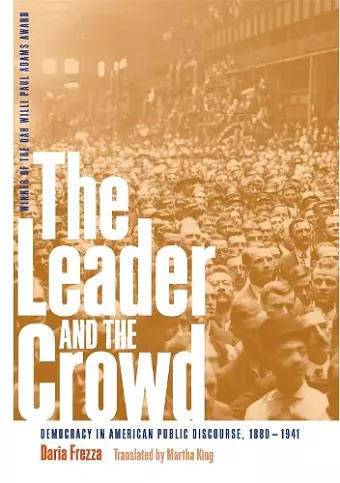The Leader and the Crowd
Democracy in American Public Discourse, 1880-1941
Daria Frezza author Martha King translator
Format:Hardback
Publisher:University of Georgia Press
Published:25th Aug '07
Currently unavailable, our supplier has not provided us a restock date

Daria Frezza covers six tumultuous decades of transatlantic history to examine how European theories of mass politics and crowd psychology influenced American social scientists' perception of crowds, mobs, democratic "people," and its leadership. In the last decades of the nineteenth century, the development of an urban-industrial mass society and the disordered influx of millions of immigrants required a redefinition of these important categories in American public discourse. Frezza shows how in the Atlantic crossing of ideas American social scientists reelaborated the European theories of crowd psychology and the racial theories then in fashion. Theorists made a sharp distinction between the irrationality of the crowd, including lynchings, and the rationality of the democratic "public."
However, this paradigm of a rational Anglo-Saxon male public in opposition to irrational mobs—traditionally considered to be composed of women, children, "savages"—was challenged by the reality of southern lynch mobs made up of white Anglo-Saxons, people who used mob violence as an instrument of subjugation over an allegedly inferior race. After World War I, when the topic of eugenics and immigration restrictions ignited the debate of exclusion/inclusion regarding U.S. citizenship, Franz Boas's work provided a significant counterbalance to the biased language of race. Furthermore, the very concept of democracy was questioned from many points of view.
During the Depression years, social scientists such as John Dewey critically analyzed the democratic system in comparison to European dictatorships. The debate then acquired an international dimension. In the "ideological rearmament of America" on the eve of World War II, social scientists criticized Nazi racism but at the same time stressed how racism was also deeply rooted in America. This is a fresh and provocative look at the parallels between the emergence of America as a world power and the maturing of the new discipline of social science.
A brilliant work of scholarship . . . Presents a strong original thesis as well as a masterly synthesis of the scholarship in its field. Of unflagging vigor and sinewy prose, it is a major contribution at the crossroads of intellectual history, politics, and cultural studies. . . . There is currently no work that covers this intellectual terrain with such comprehensiveness and argumentative strength. . . . Frezza shows how European crowd theory and American concepts of racial superiority, class, decadence, and race suicide made strange bedfellows, from academic journals to congressional hearings, as similarly grounded positions were taken by the Right and the Left to defend different policies.
Deserves careful attention . . . Presents a dynamic approach to how twentieth-century democracy was historically and theoretically construed after the triumph of the corporate state in America.
In this original approach to the transformation of democratic thought in the early twentieth century, Frezza probes the meaning of the public voice for the exercise of citizenship. This is an impressive and insightful book that captures the changing significance of the crowd as it manifested itself in public spaces and political life. It is an important contribution both to intellectual history and to the history of the social sciences.
* author of Gendering Labor History *A thoughtful and though-provoking work that contributes to our understanding of the transformation of American liberal democracy in the early twentieth century.
* American Historical ReviewISBN: 9780820329130
Dimensions: 229mm x 152mm x 26mm
Weight: 621g
352 pages